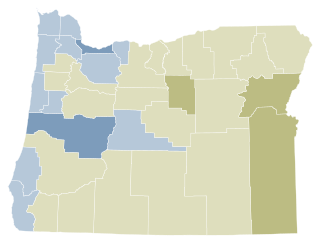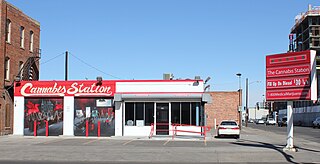
Proposition 215, or the Compassionate Use Act of 1996, is a California law permitting the use of medical cannabis despite marijuana's lack of the normal Food and Drug Administration testing for safety and efficacy. It was enacted, on November 5, 1996, by means of the initiative process, and passed with 5,382,915 (55.6%) votes in favor and 4,301,960 (44.4%) against.

The Oregon Medical Marijuana Act, a law in the U.S. state of Oregon, was established by Oregon Ballot Measure 67 in 1998, passing with 54.6% support. It modified state law to allow the cultivation, possession, and use of marijuana by doctor recommendation for patients with certain medical conditions. The Act does not affect federal law, which still prohibits the cultivation and possession of marijuana.
California Senate Bill 420 was a bill introduced by John Vasconcellos of the California State Senate, and subsequently passed by the California State Legislature and signed by Governor Gray Davis in 2003 "pursuant to the powers reserved to the State of California and its people under the Tenth Amendment to the United States Constitution." It clarified the scope and application of California Proposition 215, also known as the Compassionate Use Act of 1996, and established the California medical marijuana program. The bill's title is notable because "420" is a common phrase used in cannabis culture.

In the United States, increased restrictions and labeling of cannabis as a poison began in many states from 1906 onward, and outright prohibitions began in the 1920s. By the mid-1930s cannabis was regulated as a drug in every state, including 35 states that adopted the Uniform State Narcotic Drug Act. The first national regulation was the Marihuana Tax Act of 1937.

Veterans for Medical Cannabis Access (VMCA), which was founded as Veterans for Medical Marijuana Access (VMMA) reflecting the pejorative word "marijuana", is an Elliston, Virginia-based non-profit service organization designed to assist American veterans who wish to be able to use marijuana for medical purposes with a doctor's recommendation. VMCA works towards the freedom for veterans to discuss the medical use of marijuana with their doctors without the risk of reprisal.

Cannabis in Oregon is legal for both medical and recreational use. In recent decades, the U.S. state of Oregon has had a number of legislative, legal and cultural events surrounding the use of cannabis. Oregon was the first state to decriminalize the possession of small amounts of cannabis and authorize its use for medical purposes. An attempt to recriminalize the possession of small amounts of cannabis was turned down by Oregon voters in 1997.

In the United States, the use of cannabis for medical purposes is legal in 38 states, four out of five permanently inhabited U.S. territories, and the District of Columbia, as of March 2023. Ten other states have more restrictive laws limiting THC content, for the purpose of allowing access to products that are rich in cannabidiol (CBD), a non-psychoactive component of cannabis. There is significant variation in medical cannabis laws from state to state, including how it is produced and distributed, how it can be consumed, and what medical conditions it can be used for.

Cannabis in California has been legal for medical use since 1996, and for recreational use since late 2016. The state of California has been at the forefront of efforts to liberalize cannabis laws in the United States, beginning in 1972 with the nation's first ballot initiative attempting to legalize cannabis. Although it was unsuccessful, California would later become the first state to legalize medical cannabis through the Compassionate Use Act of 1996, which passed with 56% voter approval. In November 2016, California voters approved the Adult Use of Marijuana Act with 57% of the vote, which legalized the recreational use of cannabis.

In Colorado, cannabis has been legal for medical use since 2000 and for recreational use since late 2012. On November 7, 2000, 54% of Colorado voters approved Amendment 20, which amended the State Constitution to allow the use of marijuana in the state for approved patients with written medical consent. Under this law, patients may possess up to 2 ounces (57 g) of medical marijuana and may cultivate no more than six marijuana plants. Patients who were caught with more than this in their possession could argue "affirmative defense of medical necessity" but were not protected under state law with the rights of those who stayed within the guidelines set forth by the state. The Colorado Amendment 64, which was passed by voters on November 6, 2012, led to recreational legalization in December 2012 and state-licensed retail sales in January 2014. The policy has led to cannabis tourism. There are two sets of policies in Colorado relating to cannabis use: those for medicinal cannabis and for recreational drug use along with a third set of rules governing hemp.

Cannabis in Maine is legal for recreational use. It was originally prohibited in 1913. Possession of small amounts of the drug was decriminalized in 1976 under state legislation passed the previous year. The state's first medical cannabis law was passed in 1999, allowing patients to grow their own plants. The cities of Portland and South Portland decriminalized the possession and recreational use of marijuana in 2013 and 2014, respectively.

"Weed the People", officially "Weed the People: A Cannabis Legalization Celebration", was an event held in Portland on July 3, 2015, two days after recreational marijuana became legal in the U.S. state of Oregon. Sponsored by the Portland Mercury and two cannabis companies, the event was attended by an estimated 1,500–2,000 people, who were provided up to seven grams of marijuana for immediate consumption or to take home. Organizers complied with restrictions on recreational sales by distributing free cannabis and required attendees to pay an entry fee. More than 1,300 tickets were sold, but the building's 500-person capacity meant long wait times to enter. Media outlets reported on the historic nature of the event, which was described as a "stoner's paradise" and a celebration of freedom.

Cannabis in Louisiana is legal only for medicinal use; recreational possession of 14 grams or less is decriminalized punishable by a fine of no more than $100. Medicinal use is allowed with a physician's written recommendation for any debilitating condition. Prior to statewide decriminalization, possession of small amounts of marijuana was first decriminalized in the cities of New Orleans, Baton Rouge, and Shreveport.

Cannabis dispensaries in the United States or marijuana dispensaries are a type of cannabis retail outlet, local government-regulated physical location, typically inside a retail storefront or office building, in which a person can purchase cannabis and cannabis-related items for medical or recreational use.

Amendment 20 was an amendment to state statutes, submitted for referendum in the 2000 general elections in the U.S. state of Colorado. The amendment was adopted by 54% of participating voters. Under the law, patients may possess up to 2 ounces of medicinal marijuana and may cultivate no more than six marijuana plants at a time. Patients who are caught with more than this in their possession may argue "affirmative defense of medical necessity" but are not protected under state law with the rights of those who stay within the guidelines set forth by the state.[4]

Cannabis in Nevada became legal for recreational use on January 1, 2017, following the passage of Question 2 on the 2016 ballot with 54% of the vote. The first licensed sales of recreational cannabis began on July 1, 2017.

Cannabis in Arizona is legal for recreational use. A 2020 initiative to legalize recreational use passed with 60% of the vote. Possession and cultivation of recreational cannabis became legal on November 30, 2020, with the first state-licensed sales occurring on January 22, 2021.

Cannabis is legal in Illinois for both medical and recreational use. Illinois became the eleventh state in the US to legalize recreational marijuana effective January 1, 2020.

Cannabis in New Jersey is legal for both medical use and recreational use. An amendment to the state constitution legalizing cannabis became effective on January 1, 2021, and enabling legislation and related bills were signed into law by governor Phil Murphy on February 22, 2021.

Cannabis in Washington relates to a number of legislative, legal, and cultural events surrounding the use of cannabis. On December 6, 2012, Washington became the first U.S. state to legalize recreational use of marijuana and the first to allow recreational marijuana sales, alongside Colorado. The state had previously legalized medical marijuana in 1998. Under state law, cannabis is legal for medical purposes and for any purpose by adults over 21.

The COVID-19 pandemic had a significant impact on the cannabis industry. Investor's Business Daily said the industry was affected as "customers stock up on prescriptions and recreational customers load up on something to make the lockdown a little more mellow or a little less boring".















